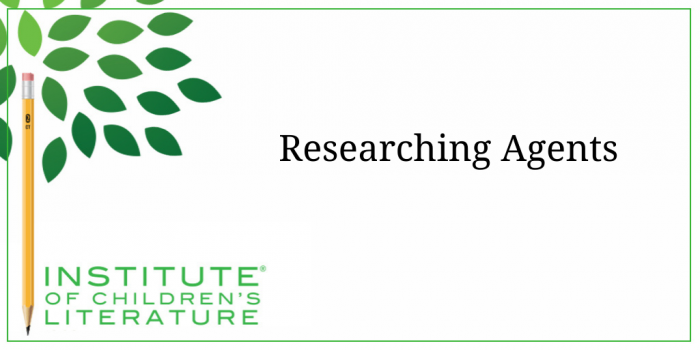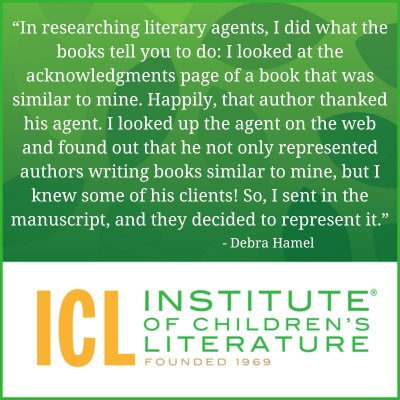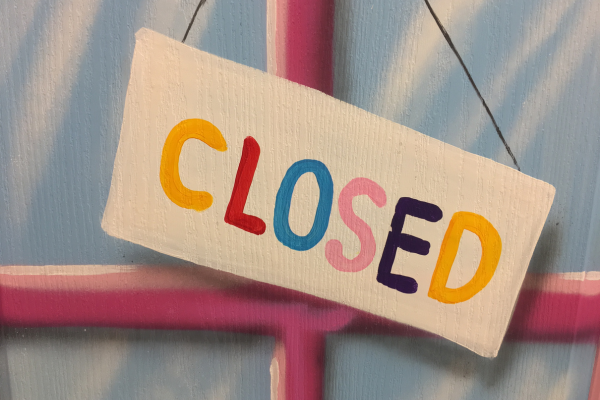1000 N. West Street #1200, Wilmington, DE 19801
© 2024 Direct Learning Systems, Inc. All rights reserved.

Not every children’s writer needs an agent.
Many areas of publishing are completely accessible to unagented writers. But for novelists, especially young adult novelists, having an agent affords a writer considerable benefit.

Agents also advise writers about the best contract terms and negotiate on the writer’s behalf to get the best deal. Agents try to get as much money for the writer as possible, because an agent doesn’t get paid directly by the writer. Agents work on commission, so an agent’s pay comes from a percentage of the author’s income off the book deal. This makes agents work very hard because the agent’s success is dependent on the author’s success. This is also why it can be hard to get an agent. If your manuscript is a better fit with small, more accessible publishers, many agents will pass, because the smaller markets don’t pay as well so the percentage of the author’s income won’t be enough to make the agent’s efforts financially viable. That means that being rejected by an agent doesn’t mean you have a bad book. You may simply have a book that will greatly appeal to a smaller segment of the market, one serviced by publishers you can deal with directly.
So if you are sure your manuscript has wide commercial appeal and isn’t a good match with the smaller publishers you can access on your own, how do you go about researching an agent? First, you need to think about what you want from them. You want someone who will work hard on your behalf. This is why it isn’t a good idea to work with an agent who expects you to pay them directly at any point before the publisher pays you. If you’re paying the agent directly, you’re reducing that agent’s need to work hard on behalf of your manuscript. (And by the way, same goes for a publisher looking for any kind of payment.)

The second thing you want from an agent is a solid network of connections. You can learn this in a number of ways, but they all boil down to checking to see if the agent is making sales. For instance, Publisher’s Weekly has a number of free newsletters, including one specifically for children’s writers. Children’s Bookshelf often lists recent deals made by children’s agents. By following the deals and making note of agents, you can quickly see which agents have connections with which publishers. If you don’t want to subscribe, you can find the most recent “Rights Report” on the Publisher’s Weekly website, though it may take a bit of poking around to track it down. But isn’t that always the way with research?
Another way to find possible agents is through Manuscript Wish List. You can even find a list of agents on the Manuscript Wish List website. Now it’s important to understand that an agent isn’t necessarily a good match just because they are on Manuscript Wish List. Finding an agent’s name is only the first step. The second step is finding everything you can about the agent. What deals have they made? What agency do they work for? Agencies have good reason to display the books they’ve sold so if an agent (or the agency the person is with) doesn’t seem to have any sales, you may have found a good reason not to work with that agent.
One more place to find and research agents is the ICL Book Market Guide for Children’s Writers. There is a whole section dedicated to the agents and agencies that specialize in representing children’s authors. The guide is updated yearly with new agents and new submission guidelines. It’s a great place to start your work researching agents.
Sometimes a very new agent won’t yet have sales, but you still think that agent might be a good match for your work. If that’s the case, then the next step is to check into the person’s background. Does their background suggest strong contacts in the industry?
For instance, if a writer wants to be an agent, they may know some people in the industry, but is unlikely to have the kind of far reaching contacts needed to be good at being an agent. Most of the time, someone who wants to move from one part of the industry (like writing) into being an author’s representative will do so by joining an established agency (sometimes the agency that represented them as a writer). This then opens the door for many more contacts because the agent will have the agency name recognition when they approach a publisher.
Other times, a brand new agent will go into agenting after being an editor at a publisher or maybe a career of editing (which may mean they worked for several publishers). This will bring a certain number of contacts, but that new agent will still be stronger if connected with a bigger agency. For an agent, connections are key to sales.

Publishers don’t close their doors because they are snooty, or because they aren’t interested in new voices, or because they only want bestsellers. They close their doors because reading submissions takes time that they simply do not have. So they count on agents to offer only manuscripts that might really be a good match for the publisher. And they believe the agents will do that, because they know the agents and trust them. That is why connections are so important for an agent. Connections build trust and convince the publisher that it is worth their time to read the submissions the agents make. And even then, even with well trusted agents, response times can be viciously long.
So the bottom line is research any agent you are considering. Be sure they don’t ask you for money directly. Be sure they have connections in the industry (proven through sales by that specific agent and/or sales by their agency). Once you have an offer by an agent, be sure you completely understand what the agent is saying. Ask questions until you do. All industries have industry specific terminology and publishing is no exception. So if you’re not sure what something means, ask. And if an agent seems reluctant to answer questions once they’ve connected with you, then look for another agent, because bad communication will leave you worried and frustrated throughout your relationship.
Do understand that agents who aren’t showing active interest in you also don’t have time to answer a bunch of questions of everyone who might contact them. So do your research like a researcher––dig on your own, then ask questions directly only of the agents who have showed some kind of interest in your manuscript or query letter. An agent not having time to talk to everyone in the world isn’t a “red flag.” But an agent who doesn’t have time to communicate with someone they’ve shown interest in representing is a red flag.
Research carefully and you’ll have the best chance of getting an agent when you need one and having the agent relationship that works best for both of you.
With over 100 books in publication, Jan Fields writes both chapter books for children and mystery novels for adults. She’s also known for a variety of experiences teaching writing, from one session SCBWI events to lengthier Highlights Foundation workshops to these blog posts for the Institute of Children’s Literature. As a former ICL instructor, Jan enjoys equipping writers for success in whatever way she can.
1000 N. West Street #1200, Wilmington, DE 19801
© 2024 Direct Learning Systems, Inc. All rights reserved.
1000 N. West Street #1200, Wilmington, DE 19801
© 2024 Direct Learning Systems, Inc. All rights reserved.
1000 N. West Street #1200, Wilmington, DE 19801
© 2024 Direct Learning Systems, Inc. All rights reserved.
1000 N. West Street #1200, Wilmington, DE 19801
© 2024 Direct Learning Systems, Inc. All rights reserved.

1000 N. West Street #1200, Wilmington, DE 19801
© 2025 Direct Learning Systems, Inc. All rights reserved.

1000 N. West Street #1200, Wilmington, DE 19801
©2025 Direct Learning Systems, Inc. All rights reserved. Privacy Policy.
3 Comments